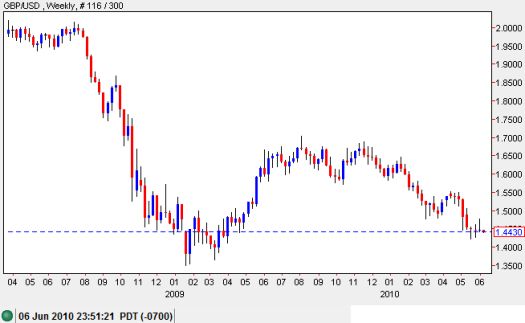While the euro catches all the headlines about its tremendous slide against the U.S. dollar, the British pound has followed closely behind. The pound has lost 12% against the U.S. dollar since its January peak while the euro has lost 18% in that same time. The pound has lost 15% since its post-recovery peak in July, 2009. In almost two years, the pound has lost an amazing 28%.
I have been bearish on the pound since September of last year. However, I am now removing that bearish bias given recent news about the new British government’s plans to take serious steps to get its budget deficit under control.
The Telegraph reports in “Britain to emulate Canada’s radical solution to tackle debt“:
“The Chancellor will announce a ‘once-in-a-generation’ revolution in public spending inspired by Canada in the mid-1990s, when the government turned a budget deficit of nine per cent of GDP into a surplus…Canada brought public spending under control guided by the principle that people should ask ‘what needs to be done by government and what we can afford to do’. Mr Osborne and his Liberal Democrat deputy, Danny Alexander, will attempt to bring about a similar change of mindset in Britain.”
“David Cameron will warn today that the scale of the problem is worse than he thought and the potential consequences even more critical. The Prime Minister will say that the ‘momentous’ decisions he will take will have ‘enormous implications’ that will affect everyone.
The new approach to public spending will see:
- An unprecedented public consultation exercise on what people expect from public services and where they think the cuts should fall.
- A fundamental re-evaluation of the relationship between government and the public sector.
- A new ‘star chamber’ of Cabinet ministers vetting every departmental budget.”
If the U.K. can get anywhere close to Canada’s success, the milestone will mark one more triumph of short-term pain to achieve long-term, sustained gain. Suddenly, the U.K. looks a bit more attractive as a place to invest…and at current prices, the U.K. now looks pretty cheap.
Granted, I cannot get “fully bullish” yet since a growing financial panic is shuttling more and more investors and traders to the dollar. I am also expecting the market to take a “wait and see” and “show me” attitude toward the government’s initiatives, especially since economic growth may get worse before it gets better as a result.
But when the current episode of financial distress passes, the British pound may look like the best bargain around. As an example, the Australian and Canadian dollars remained relatively resilient against the U.S. dollar until very recently thanks to the relative strength of their respective finances (helped by strength in commodities, sane banking policies, and sound fiscal management). All else remaining the same, I do not want to bet against a currency whose government is sincerely working at getting its financial house in order. (For some comparison, the Canadian dollar lost ground against the U.S. dollar from 1996-1998, but that was also a period of tremendous growth for the U.S. not likely to be seen again for quite some time).
I will be watching very closely this week’s interest rate decision by the Bank of England. It is always possible that the BoE’s campaign to devalue the pound may yet prove stronger than the will of fiscal policy. (For more background, see Bank of England (BoE) Monetary Policy Committee Member Adam Posen talk about his concerns over inflation).

Source: dailyfx.com charts
Be careful out there!
Full disclosure: long GBP/USD, short GBP/AUD, long FXA
